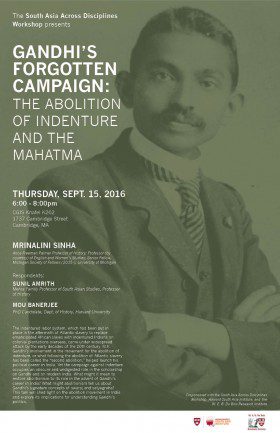Student Event
Presented by the South Asia Across Disciplines Workshop
Mrinalini Sinha, Alice Freeman Palmer Professor of History; Professor (by courtesy) of English and Women’s Studies; Senior Fellow, Michigan Society of Fellows (2015-), University of Michigan
Respondents:
Sunil Amrith, Mehra Family Professor of South Asian Studies, Professor of History
Mou Banerjee, PhD Candidate, Dept. of History, Harvard University
Cosponsored by the South Asia Across Disciplines Workshop and the W. E. B. Du Bois Research Institute
The indentured labor system, which had been put in place in the aftermath of Atlantic slavery to replace emancipated African slaves with indentured Indians on colonial plantations overseas, came under widespread attack by the early decades of the 20th century. M.K. Gandhi’s involvement in the movement for the abolition of indenture, or what following the abolition of Atlantic slavery has been called the “second abolition,” helped launch his political career in India. Yet the campaign against indenture occupies an obscure and undigested role in the scholarship on Gandhi and on modern India. What might it mean to restore abolitionism to its role in the advent of Gandhi’s career in India? What might abolitionism tell us about Gandhi’s signature concepts of swaraj and satyagraha? This talk will shed light on the abolition movement in India and explore its implications for understanding Gandhi’s politics.

